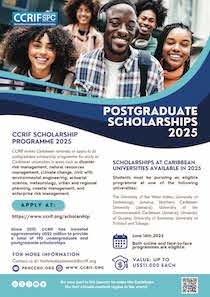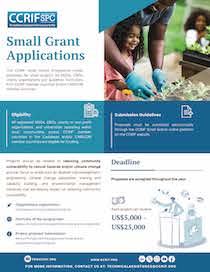Tropical Cyclone Laura was the thirteenth tropical cyclone in the 2020 Atlantic Hurricane Season and the earliest twelfth named storm on record in the North Atlantic basin. On 21 August, it was upgraded from a tropical depression to a tropical storm while it was over the tropical Atlantic, just to the east of the northern Leeward Islands. On the same day, its centre passed between Antigua and Barbuda, Montserrat and Saint Kitts and Nevis, spreading tropical-storm-force winds over these countries.
Jamaica was under the influence of Tropical Storm Laura resulting in adverse weather conditions that occurred between 23 August (2300UTC) and 24 August (0900UTC), 2020. During this period, Jamaica was affected by intense rainfall.
Antigua and Barbuda was under the influence of Tropical Storm Laura resulting in adverse weather conditions that occurred between 21 August (1700UTC) and 22 August (1500UTC), 2020. During this period, Antigua and Barbuda was affected by heavy rainfall.
Panama was under the influence of a monsoon trough and several tropical waves resulting in adverse weather conditions that occurred between 13 and 21 August, 2020. During this period, adverse weather prevailed over Panama generating heavy rains and high winds over a large area of the territory.
Tropical Cyclone Isaias was the ninth tropical cyclone in the 2020 Atlantic Hurricane Season. On 28 July it developed as Potential Tropical Cyclone Nine over the central Atlantic, to the east of the Leeward Islands. On 29 July, it was upgraded to a tropical cyclone while it was over the Caribbean Sea, to the south of Puerto Rico. On 30 July, it strengthened to a category 1 hurricane while it was to the north of the Dominican Republic.
A magnitude 5.0 earthquake occurred at 00:03:46 UTC on 2 August 2020, 34.7 km (21.6 mi) NW of Güiria, Venezuela; 113.3 km (70.4 mi) W of Port of Spain, Trinidad and Tobago and 115.5 km (71.8 mi) NW of Point Fortin, Trinidad and Tobago. Estimates from the United States Geological Survey (USGS) located the epicentre of the event at 10.767°N, 62.550°W, and at a depth of 91.7 km (56.9 mi).
Gonzalo was the seventh tropical cyclone in the 2020 Atlantic Hurricane Season. On 22 July it developed as a tropical storm over the central Atlantic, to the east of the southern Windward Islands. On 25 July, Tropical Storm Gonzalo made landfall on Trinidad, affecting the island with tropical-storm-force winds, while Tobago experienced winds below 39 mph.
A magnitude 5.0 earthquake occurred at 00:03:46 UTC on 2 August 2020, 34.7 km (21.6 mi) NW of Güiria, Venezuela; 113.3 km (70.4 mi) W of Port of Spain, Trinidad and Tobago and 115.5 km (71.8 mi) NW of Point Fortin, Trinidad and Tobago. Initial estimates from the United States Geological Survey (USGS) located the epicentre of the event at 10.767°N, 62.550°W, and at a depth of 91.7 km (56.9 mi).
Tropical Cyclone Isaias was the ninth tropical cyclone in the 2020 Atlantic Hurricane Season. On 28 July it developed as Potential Tropical Cyclone Nine over the central Atlantic, to the east of the Leeward Islands. On 29 July, it was upgraded to a tropical cyclone while it was over the Caribbean Sea, to the south of Puerto Rico. On 30 July, it strengthened to a category 1 hurricane while it was to the north of the Dominican Republic.
A magnitude 5.4 earthquake occurred at 22:38:43 UTC on 12 July 2020, 6.4 km (4 mi) W of El Crucero, Nicaragua; 18.1 km (11.3 mi) S of Ciudad Sandino, Nicaragua and 18.3 km (11.4 mi) NNE of San Rafael del Sur, Nicaragua. Estimates from the United States Geological Survey (USGS) located the epicentre of the event at 11.998°N, 86.368°W, and at a depth of 158.8 km (98.7 mi) – Figure 1. Nicaragua was the only CCRIF member country where peak ground acceleration, computed with the CCRIF SPHERA model, was greater than 0.01 g for this earthquake.





